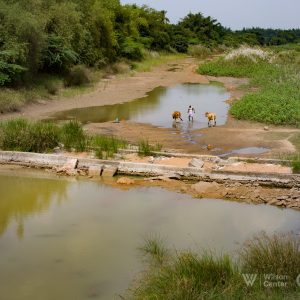The Stream, April 19: In Drought, Indian State Bans New Wells in Tech Hub
The Global Rundown
Because of declining groundwater levels, no new wells for six months in India’s tech hub of Hyderabad, say state authorities. Concerned about water shortages, South Africa’s electric power utility will install a small groundwater desalination plant at a nuclear power station near Cape Town while city officials consider their own desalination facility as reservoir levels decline. The New York state budget includes $US 2.5 billion for water infrastructure. California officials approve a $US 275 contract to repair the damaged spillways at Oroville Dam while a university report identifies the spillway’s weak spot. A sugary drinks tax in Berkeley, California, slashed soda sales while lifting bottled water purchases.
“Clean water is a bipartisan issue. This is an area where there are not Republicans, and there are no Democrats. We all like clean water coming into our house.” — Assemblyman Sean M. Ryan, a Democrat in the New York Legislature, talking about a $US 2.5 billion water infrastructure bill that was included in the state’s 2017-18 budget. Some 40 percent of the funds go toward repairing drinking water and sewer systems, but money is also earmarked for protecting source waters, installing green infrastructure, and upgrading septic systems. (Buffalo News)
By The Numbers
$US 275 million: Winning bid for the contract to repair the damaged spillways at California’s Oroville Dam. Kiewit Corporation, the Omaha, Nebraska, company that won the contract, will begin construction in May or June. Sacramento Bee
In context: Aging dams are a hazard across the United States.
Science, Studies, And Reports
Bottled water sales in Berkeley, California, increased by 15 percent while sales of sodas and related beverages declined nearly 10 percent in the year following a city sales tax on sugar-added drinks, according to a study from the University of North Carolina and the Public Health Institute. The one-cent-per-ounce tax went into effect on March 1, 2015. PLOS Medicine
“The spillway failed at its weakest point,” says a retired University of California, Berkeley civil engineering professor in a report on the spillway damage at Oroville Dam. Robert Bea studied dam design drawings, inspection reports, and spillway photos, eventually pinpointing a clay drainage pipe embedded in the spillway as the weak point. The pipe did not have enough concrete covering it to hold fast against the force of the reservoir releases. A study ordered by federal regulators is also in progress. Los Angeles Times
On The Radar
Authorities in the Indian state of Telangana issued a six-month ban on new wells in Hyderabad, the capital and a tech industry hub. Earlier in the month, authorities prohibited new wells in more than 1,000 villages. Critics say that the bans are frequently flouted, with no penalty. Times of India
Eskom, South Africa’s primary electric power utility, says that it will build a small groundwater desalination plant at a nuclear power station located some 30 kilometers northwest of Cape Town, where water shortages are a concern. The desalinated water would be used for power station operations, according to the plant manager. Koeberg is the only commercial nuclear power station in Africa. News 24
Meanwhile, Cape Town officials, spooked by low reservoirs that have less than 100 days of water supplies, are studying plans for a large municipal desalination facility at the nuclear plant. News 24
In context: Drought in South Africa is an immense challenge for energy and food production.
Brett writes about agriculture, energy, infrastructure, and the politics and economics of water in the United States. He also writes the Federal Water Tap, Circle of Blue’s weekly digest of U.S. government water news. He is the winner of two Society of Environmental Journalists reporting awards, one of the top honors in American environmental journalism: first place for explanatory reporting for a series on septic system pollution in the United States(2016) and third place for beat reporting in a small market (2014). He received the Sierra Club’s Distinguished Service Award in 2018. Brett lives in Seattle, where he hikes the mountains and bakes pies. Contact Brett Walton




